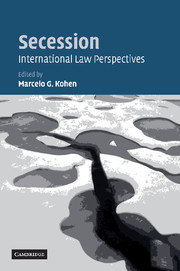Book contents
- Frontmatter
- Contents
- List of contributors
- Preface
- Table of cases
- Table of international instruments
- List of abbreviations
- Introduction
- PART I The Foundations of International Law and Their Impact on Secession
- PART II International and Domestic Practice
- 9 The question of secession in Africa
- 10 International law and secession in the Asia and Pacific regions
- 11 Secession and international law: the European dimension
- 12 Secession and international law: Latin American practice
- 13 Lessons learned from the Quebec Secession Reference before the Supreme Court of Canada
- 14 The Secession of the Canton of Jura in Switzerland
- 15 Conclusions
- Select bibliography
- Index
12 - Secession and international law: Latin American practice
Published online by Cambridge University Press: 23 July 2009
- Frontmatter
- Contents
- List of contributors
- Preface
- Table of cases
- Table of international instruments
- List of abbreviations
- Introduction
- PART I The Foundations of International Law and Their Impact on Secession
- PART II International and Domestic Practice
- 9 The question of secession in Africa
- 10 International law and secession in the Asia and Pacific regions
- 11 Secession and international law: the European dimension
- 12 Secession and international law: Latin American practice
- 13 Lessons learned from the Quebec Secession Reference before the Supreme Court of Canada
- 14 The Secession of the Canton of Jura in Switzerland
- 15 Conclusions
- Select bibliography
- Index
Summary
Introduction
Prior to the nineteenth century, secession was probably the most typical mode for States to come into existence, especially when we bear the process of independence of the American colonies in mind.
Unlike the case of the Portuguese colony in South America, independence of the Spanish colonies constituted a very complex and unique process. The territory colonised by Spain was considerably vast, with different regions, each with its own characteristics. Consequently, the administrative divisions created by the Spanish Crown enjoyed ample autonomy. Thus, in the case of these colonial territories, the ‘secession’ or ‘emancipation’ from the metropolitan State did not always take place in a uniform manner, as opposed to the ‘no particular case of dismemberment or secession’ in the case of the South American Portuguese colony.
This chapter outlines a general picture of the colonisation, independence and dismemberment of the Spanish colonies in the Americas during the process of independence experienced by the Latin American States.
The Spanish colonies in the Americas declared their independence progressively. In some cases, it took a long time before Spain formally recognised them, in spite of the fact that they had established enduring control over their territory. They were first recognised by third States such as Portugal and the United States who led the way, followed by Great Britain. The delay on the part of the metropolitan State in recognising new States in cases of secession through a war of independence made some sense, as the secession could constitute a long drawn-out process and one whose results might be reversed.
- Type
- Chapter
- Information
- SecessionInternational Law Perspectives, pp. 374 - 415Publisher: Cambridge University PressPrint publication year: 2006
- 2
- Cited by



